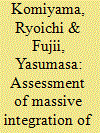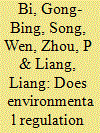|
|
|
Sort Order |
|
|
|
Items / Page
|
|
|
|
|
|
|
| Srl | Item |
| 1 |
ID:
127872


|
|
|
|
|
| Publication |
2014.
|
| Summary/Abstract |
Maximizing renewables in the country's power system has been a key political agenda in Japan after the Fukushima nuclear disaster. This paper investigates the potential of PV resource, which could be systematically integrated into the Japanese power system, using a high time-resolution optimal power generation mix model. The model allows us to explicitly consider actual PV and wind output variability in 10-min time resolution for 365 days. Simulation results show that, as PV expands, the growth of PV integration into the grid slows down when the installed PV capacity is more than the scale of the peak demand, although Japan has immense potential of installable PV capacity - equivalent to 40 times of the peak. Secondly, the results imply that a large-scale PV integration potentially decreases the usage ratio of LNG combined cycle (LNGCC) in specific seasons, which is a challenge for utility companies to ensure that LNGCC is used as a profitable compensating generator for PV variability. Finally, a sensitivity analysis on rechargeable battery cost suggests that the reason for suppressing the PV output instead of storing its surplus output by the battery can be attributed to the high battery cost; hence, the improvement of its economic performance is significant to integrate the massive PV energy.
|
|
|
|
|
|
|
|
|
|
|
|
|
|
|
|
| 2 |
ID:
128027


|
|
|
|
|
| Publication |
2014.
|
| Summary/Abstract |
Data envelopment analysis (DEA) has gained much popularity in performance measurement of power industry. This paper presents a slack-based measure approach to investigating the relationship between fossil fuel consumption and the environmental regulation of China's thermal power generation. We first calculate the total-factor energy efficiency without considering environmental constraints. An environmental performance indicator is proposed through decomposing the total-factor energy efficiency. The proposed approach is then employed to examine whether environmental regulation affects the energy efficiency of China's thermal power generation. We find that the environmental efficiency plays a significant role in affecting energy performance of China's thermal generation sector. Decreasing the discharge of major pollutants can improve both energy performance and environmental efficiency. Besides, we also have three main findings: (1) The energy efficiency and environmental efficiency were relatively low. (2) The energy and environmental efficiency scores show great variations among provinces. (3) Both energy efficiency and environmental efficiency are of obvious geographical characteristics. According to our findings, we suggest some policy implications.
|
|
|
|
|
|
|
|
|
|
|
|
|
|
|
|
| 3 |
ID:
127305


|
|
|
|
|
| Publication |
2014.
|
| Summary/Abstract |
The emergence of biofuel as a renewable energy source offers opportunities for significant climate change mitigation and greater energy independence to many countries. At the same time, biofuel represents the possibility of substitution between energy and food. For developing countries like India, which imports over 75% of its crude oil, fossil fuels pose two risks-global warming pollution and long-term risk that oil prices will undermine real living standards. This paper examines India's options for managing energy price risk in three ways: biofuel development, energy efficiency promotion, and food productivity improvements. Our salient results suggest that biodiesel shows promise as a transport fuel substitute that can be produced in ways that fully utilize marginal agricultural resources and hence promote rural livelihoods. First-generation bioethanol, by contrast, appears to have a limited ability to offset the impacts of oil price hikes. Combining the biodiesel expansion policy with energy efficiency improvements and food productivity increases proved to be a more effective strategy to enhance both energy and food security, help mitigate climate change, and cushion the economy against oil price shocks.
|
|
|
|
|
|
|
|
|
|
|
|
|
|
|
|
| 4 |
ID:
127903


|
|
|
|
|
| Publication |
2014.
|
| Summary/Abstract |
This study explores factors related to energy consumers' perceptions of government subsidies for utility provided energy efficiency (EE) programs and for utility providers' use of more clean/alternative energy sources. Demographic factors, attitudes, planned purchases, and perceptions of utility provider motives in relation to governmental and utility provider EE initiatives (i.e. providing discounts and coupons for CFL bulbs), plus the influence of gain- and loss-framed messages are investigated. Over 2000 respondents completed a 16 item phone survey. Hierarchical regression explained 38% of the variance in reactions regarding government subsidies of the cost of utility provided EE programs and 43% of the variance in perceptions involving whether utility companies should use of more clean or alternative forms of energy. Gender and party differences emerged. Loss-framed messages were more important when the issue was government subsidies. Both gain- and loss-framed messages were important when clean/alternative energy was the issue.
|
|
|
|
|
|
|
|
|
|
|
|
|
|
|
|
| 5 |
ID:
127908


|
|
|
|
|
| Publication |
2014.
|
| Summary/Abstract |
We seek to evaluate the extent of the pass through of increased fuel and carbon costs to wholesale prices with a shift of generation from coal-fired to gas-fired plants. Modelling of Australia's National Electricity Market in 2035 is undertaken using Australian Energy Market Operator assumptions for fuel costs, capital costs and demand forecasts. An electricity market simulation package (PLEXOS), which uses deterministic linear programming techniques and transmission and generating plant data, is used to optimize the power system and determine the least cost dispatch of generating resources to meet a given demand. We find that wholesale market prices increase due to the full pass through of the increased costs of gas over coal as an input fuel and the Carbon Price. In addition, we find that wholesale prices increase by more than the pass through of fuel and carbon costs because of the fact that generators can charge infra-marginal rents and engage in strategic behaviour to maximize their profits.
|
|
|
|
|
|
|
|
|
|
|
|
|
|
|
|
| 6 |
ID:
127999


|
|
|
|
|
| Publication |
2014.
|
| Summary/Abstract |
Around the world there is increasing interest from government and industry in the potential for Carbon Capture and Storage (CCS) technologies to play a part in decarbonisation. This paper examines how people with little previous exposure to CCS technology, frame and discuss it, and how in the absence of information, ideas, notions, values and experiences shape opinion. We present data from a series of focus groups held with environmental activists, planning councillors, and adult and youth community group members in London in 2012. We found that views on CCS are shaped strongly by wider factors, particularly trade offs between different energy futures. Lay-critiques were similar to those put forward by environmental groups and were strongly framed by conceptions of nuclear power. We argue that although there is little public disquiet concerning this technology in private opinions were generally negative. This, and the use of nuclear power as a framing device, may present a challenge to policy-makers and industry committed to implementing CCS while promoting education as the main mechanism for public acceptance.
|
|
|
|
|
|
|
|
|
|
|
|
|
|
|
|
| 7 |
ID:
129364


|
|
|
|
|
| Publication |
2012.
|
| Summary/Abstract |
With the need for alternative sources of energy on the rise, especially in recent years, it is no surprise that the defence sector can be one of the largest consumer of solar power in India.
|
|
|
|
|
|
|
|
|
|
|
|
|
|
|
|
|
|
|
|
|